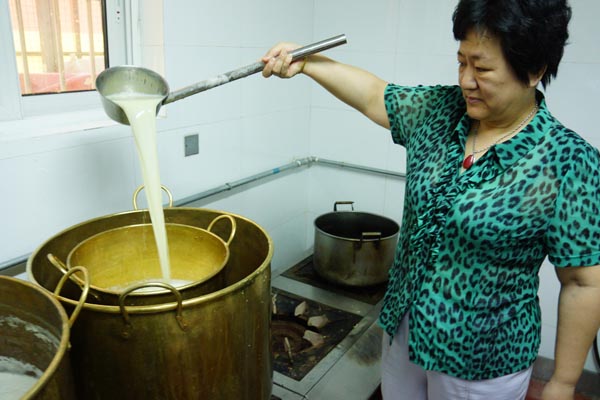When smelly is good
Douzhi'er, a stinky bean juice loved by old Beijingers, has plenty of health benefits.
One man's food is another man's poison. Many people consider douzhi'er, fermented bean juice, as Beijing's most typical traditional drink. But consumers hold radically different opinions about it.
"A non-local customer once approached me, and asked softly:'Has your drink gone bad?'" recalls Liu Chunping, manager of Jin Xin Douzhi'er Restaurant. The Muslim shop always has a long line of customers on weekends.
 |
|
Liu Chunping cooks douzhi'er at Jin Xin Douzhi'er Restaurant in Beijing. Photos by Ye Jun / China Daily |
Douzhi'er, made from green beans, goes through several days of fermenting before it is served. Therefore, the smell is not appetizing. But to many old Beijingers, it is their favorite drink and addictive.
Related:
Eat like a local: Beijing
Bite-sized stroll in Beijing
It tastes sour at first, reminding one of vinegar, but one will relish the aftertaste of green bean fragrance.
It is said that to the best way to know if one is a Beijinger is to invite him or her to drink a bowl of douzhi'er. If the person frowns and spits the drink, he or she is definitely not a genuine Beijinger. But if the person smiles and finishes it, then he or she is.
Beijinger Han Ping has a bottle of douzhi'er in her refrigerator all year round. "In summer, I'll drink it cold. It relieves summer heat, and quenches thirst," she says. "In winter, you can drink it when it's very hot so that you sweat and feel comfortable in the stomach area."
Like tea, there are some rules in drinking douzhi'er, she says.
Douzhi'er must be accompanied by jiaoquan'er, a crispy ring of dough, and pickle slices.
The fragrant crispy dough ring balances the sour taste of the bean juice, while salty pickle slices complete the combo.
Han says in the past, douzhi'er was a poor people's drink.
"It dispels excessive heat in the body, helps with digestion, and prevents cold," she says. "It helps people stay well in all four seasons."
Liu Chunping says before 1949, rickshaw pullers would buy a bottle of douzhi'er, and drink it the whole day. A bowl of douzhi'er, which used to cost just two fen (the smallest unit of the Chinese currency), and two steamed buns makes a meal for a poor Beijinger.
The history of Beijing douzhi'er dates back to the Qing Dynasty (1644-1911). It is said that it was the favorite drink for Manchurians in the Baqi garrison. It was so popular that eventually the Qing emperor and empress dowager both ordered it from the imperial kitchen, to relieve the feeling of greasiness from eating too much meat. Since then what was a cheap drink for the poor became popular also for the rich.
But times have changed. Not only do some tourists find douzhi'er very hard to swallow, some young Beijingers no longer drink it.
Han Ping says douzhi'er smells like smelly bean curd. And she says it is an acquired taste. "After that, chances are they will become addicted to it," she says.
Liu Xushui, 50, a Hebei province native, who has lived in Beijing for 30 years, is a fan of the smelly bean juice. He says he used to have indigestion problems, and he always felt stomach discomfort when he over ate, or drank cold beverages. But after years of drinking douzhi'er regularly, his stomach problems have disappeared.
The health benefit of douzhi'er could be attributed to the properties in green beans. Chinese medicine believes green beans can dispel heat and have a detoxification function. Douzhi'er is believed to be rich in vitamin C and vegetable protein. The fermentation process might have generated beneficial bacteria too.
Liu has worked for Jin Xin Douzhi'er Restaurant for six years as a douzhi'er chef. His job scope is to prepare precooked green bean juice to the restaurant, where it will then be boiled and served.
















